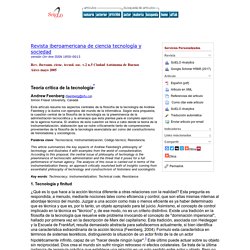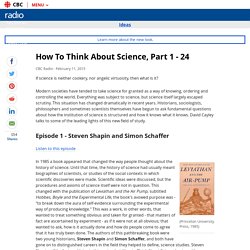

Teoría crítica de la tecnología. Teoría crítica de la tecnología* Andrew Feenberg (feenberg@sfu.ca) Simon Fraser University, Canadá Este artículo resume los aspectos centrales de la filosofía de la tecnología de Andrew Feenberg y la ilustra con ejemplos del mundo de la informática.

Según esta propuesta, la cuestión central de la filosofía de la tecnología es la preeminencia de la administración tecnocrática y la amenaza que ésta plantea para el completo ejercicio de la agencia humana. El análisis de esta cuestión se lleva a cabo desde la teoría de la instrumentalización, elaboración que se nutre críticamente tanto de comprensiones provenientes de la filosofía de la tecnología esencialista así como del constructivismo de historiadores y sociológicos.
Palabras clave: Tecnocracia; Instrumentalización; Código técnico; Resistencia. This article summarizes the key aspects of Andrew Feenberg's philosophy of technology, and illustrates it with examples from the world of computerization. 1. 2. 3. 4. 5. 6. 6.1. La teoría crítica de la tecnología: revisión de conceptos. Sesiones de Filosofía de la Técnica y la Tecnología por Cesar Augusto Hernández Gualdrón.
Paul Virilio: Pensar la Velocidad. Introducción a la Escuela de Frankfurt. Jose Antonio López Cerezo. How To Think About Science, Part 1 - 24 - Home. If science is neither cookery, nor angelic virtuosity, then what is it?

Modern societies have tended to take science for granted as a way of knowing, ordering and controlling the world. Everything was subject to science, but science itself largely escaped scrutiny. This situation has changed dramatically in recent years. Historians, sociologists, philosophers and sometimes scientists themselves have begun to ask fundamental questions about how the institution of science is structured and how it knows what it knows.
David Cayley talks to some of the leading lights of this new field of study. Episode 1 - Steven Shapin and Simon Schaffer Listen to this episode (Princeton University Press, 1985)In 1985 a book appeared that changed the way people thought about the history of science. Episode 2 - Lorraine Daston Listen to this episode (Lorraine Daston)The Max Planck Institute for the History of Science occupies an elegant and airy new building in a leafy suburb of Berlin. Episode 3 - Margaret Lock. Michel Serres Las nuevas tecnologías, revolución cultural y cognitiva. Langdon Winner reflects on Autonomous Technologies #4S2017. Sobre Paul Virilio: el ocaso de la ciencia. A. Feenberg & B. Stiegler, “Technology at the End of the World” Dr. Andrew Feenberg: Ten Paradoxes of Technology. Borgmann, Mitcham, Feenberg: A Panel Discussion.
Sociología de la ciencia y de la biología (Andrew Feenberg) The Essential Marcuse. Documentary on Herbert Marcuse (1996) 'The Frankfurt School'-In Our Time BBC Radio 4. Tecnologia Social. Universidade de Brasília. Hebe Vessuri: ciencia, tecnología, sociedad y ambiente. Ciencia Tecnología y Sociedad, XIX Congreso de ...